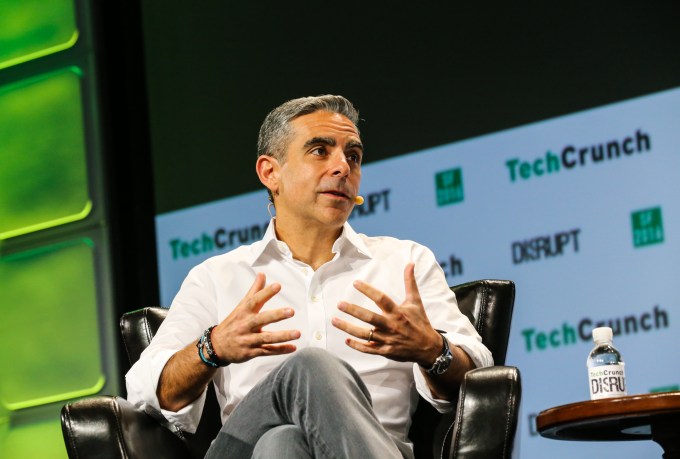Facebook looks to be jumping on the blockchain wagon with plans to introduce its own stablecoin, according to a report from Bloomberg.
The social network company — under fire for a seemingly constant stream of privacy snafus of late — created an internal blockchain division in May and, while there has been plenty of speculation, the exact nature of its work is unclear.
The Bloomberg report is a first solid suggestion at what will come from the new division and, according to the publication, it’ll be a stablecoin that “let[s] users transfer money on its WhatsApp messaging app, focusing first on the remittances market in India.”
Facebook offered a non-committal response.
“Like many other companies, Facebook is exploring ways to leverage the power of blockchain technology. This new small team is exploring many different applications. We don’t have anything further to share,” it told Bloomberg in a statement.
If the U.S. giant does carry out the plan that Bloomberg is reporting it would (easily) be the largest company to embrace consumer blockchain service. That’s both in terms of the size of the business — a $376 billion market cap and annual revenue of more than $40 billion — and the user base it touches. Facebook reaches more than 2.2 billion people for its core social network, 1.5 billion for WhatsApp, 1.3 billion for Messenger and a further one billion via Instagram.
That makes this a thread worth pulling, so let us get into it.

Yet another stablecoin
Stablecoins have become all the rage in the blockchain space during the second half of this year, with scores of projects popping up to provide solutions — but let’s start with why.
The concept is simple: a cryptocurrency that is pegged to a fiat currency and therefore immune to the often wild valuation swings.
Blockchain as programmable and border-less money has potential, but stability is a huge concern. Bitcoin, for example, hit a record high of nearly $20,000 one year ago; today its price is just over $4,000 but, symbolically, it fell below that figure in recent months. The ride for “altcoins” has been even bumpier.
Stablecoins offer a way to deposit money ahead of buying into Bitcoin, Ethereum or other tokens more quickly than a bank account. They also allow profits to be moved from volatile tokens and, among other things, are a more stable way of sending crypto to another person (or business) without being subject to moving prices.
Yet, despite a simple premise, there are no current examples of a proven and successful stablecoin, despite the many who have thrown their hats into the ring.
Tether, the highest-profile project, is dogged by concerns around its financial backing. The organization behind it has never shown that it has the required fiat currency to back the tokens in the market, while its value has previously slipped below $1.
As Tether flails, cryptocurrency exchanges launch rival stablecoins
As TechCrunch wrote in November, a number of “Tether-killers” have stepped forward, but none have dethroned the top dog. USD Coin, an Ethereum-based project that trades on top exchange like Coinbase and Binance, is the second widest used option with a total market cap of $230 million. Impressive, but that’s less than 15 percent of Tether’s $1.8 billion, which illustrates the gap.
Then there are regulatory concerns.
Basis, which had raised more than $130 million from big-name investors like Andreessen Horowitz and Bain Capital, shut down this month, 18 months after its founding, because it found there is “no way to avoid securities status for bond and share tokens.”
Fintech services
Details are scant right now, but it looks like Facebook’s proposed stablecoin is more of a technology play than a move to give cryptocurrency owners that much-demanded stable peg.
Instead, it may be a bet that the company can add financial services and products to its hugely popular messaging services. Fintech is booming in emerging markets where digital platforms and data can help overcome limited credit scoring systems and low banking rates, but Facebook hasn’t really stepped into the ring. Its sole move has been with WhatsApp, and has already implemented peer-to-peer transactions in India, so global money transfers and other financial features can make sense.
Cheaper and faster international money transfers were a suggestion that I raised one year ago when I wrote that Mark Zuckerberg was right to look into blockchain opportunities. Writing his New Year goals for 2017, the Facebook CEO said he intended to study encryption and the blockchain to “see how best to use them in our services.”
WhatsApp has more than 1.5 billion monthly active users, with India, its large single market, accounting for some 200 million of that number. India is also the largest destination for global remittances, with $69 billion in transfers sent into the country during 2017, according to data from the World Bank.
Beyond remittance, a stablecoin could be used for many more things. Right from buying digital goods and services to peer-to-peer payments and more aggressive areas like crypto trading, lending and more.
What does seem clear is that the work is at an early stage within Facebook’s blockchain division, which is said to have some 30-odd employees at this point.
Chat apps get into crypto and blockchain
WhatsApp would be far from the first messaging service to embrace blockchain if the project continued as Bloomberg expects. Although, ironically, others have taken to crypto in order to provide a differentiator to compete with dominant services WhatsApp and Facebook Messenger.
Canada-based chat app Kik raised $100 million through an ICO in 2017 that created its own token (Kin) and a blockchain to support developer apps. The fundamental plan, Kik CEO Ted Livingston told TechCrunch last year, was to enable developers to build apps that monetize “positively” through user attention or engagement, rather than the advertising model per Facebook. Revenue would be paid out in Kin using various user-centric metrics.
Far from a crypto apologist, Livingston has been criticized for calling blockchain technology “useless.” The Kik app isn’t blockchain-based yet, but it has released beta products starting this summer.

Line, a Japanese app popular across parts of Asia, has also embraced blockchain with an in-app token called Link, its own trading exchange and a crypto investment fund. The company didn’t hold an ICO; instead it plans to distribute Link tokens to users for tasks and engagement while it also can be bought and sold. Link will eventually become a method to buy Line services or goods and there are plans to extend usage to third-party services, Line has said.
Then there’s Telegram, the messaging app from the founders of Russia’s Facebook alternative — VKontakte — the Durov brothers. Telegram, which gained popularity among the crypto industry, went all in on ICOs, raising $1.7 billion in a much-anticipated sale that, in the end, was limited to accredited investors only.
It was criticized, however, for a long-winded white paper that set out overly ambitious goals for its “decentralized” platform. The project has maintained a low profile and little has been said about its current status beyond a messy situation that has seen some investors cash in before a product is even released.
One other notable chat app in crypto is Status, which raised more than $100 million in Ethereum in 2017 to develop a decentralized chat app and ecosystem. Status is available for use, but the company itself has run into financial issues and this month it laid of 25 percent of its 100 staff, according to Coindesk.
Meanwhile, Kakao, Korea’s largest messaging app company, has a blockchain company. Details on planned products are unclear, but Kakao has made investments into blockchain businesses.































Comment